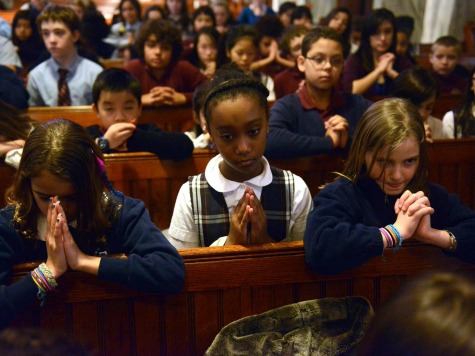While much focus has recently been on the issues the Common Core Learning Standards (CCLS) are creating for public education, private faith-based schools stand to be affected negatively by the standards, as well.
Although these private schools are not required to follow government direction regarding standards and curriculum, the CCLS as a de facto national standard will negatively affect the autonomy of these faith-based schools, chipping away at the religious freedom they enjoy.
While proponents claim the CCLS is a voluntary, state-led effort, there is no denying the fact that the federal government poured billions of dollars into its quick establishment. Race to the Top monetary grants and No Child Left Behind waivers were contingent on a state’s adoption of the standards, and the Department of Education awarded $350 million to two consortia of states to develop assessments aligned with the Common Core. Additionally, in the spring of 2013, the Department of Education established a technical review panel whose sole purpose is to evaluate the CCLS-aligned assessments. This use of federal funds to support the implementation and advancement of the standards indicates a federal endorsement, effectively moving control over the standards to the federal level and away from local leaders.
The loss of local control over educational decisions is one of the main problems with a national standard like the CCLS. Real education reform takes place when decisions about appropriate standards remain local, made by the people who know and understand the students in their community and are invested in their success. This kind of local decision-making is one of the main reasons private, faith-based schools have enjoyed great success. All private schools enjoy a certain autonomy which allows them to make their own educational decisions regarding standards, curriculum, and teaching methods as they work to meet the individual needs of their students. Faith-based schools also enjoy the freedom to follow their mission rooted in their faith and to provide an excellent education from a religious worldview.
The CCLS pose a threat to this autonomy in several ways. A national standard will pressure schools to follow a uniform national curriculum and will drive the development of a uniform national test. (What good is the standard without a curriculum to meet the standard and a test to ensure the standard has been met?) Two national tests for the Common Core have already been created (funded by the Department of Education), and recent announcements show that college entrance exams will be aligned to the Common Core. If the developers of college entrance exams shift their focus from general college readiness to a uniform set of national standards, a significant and potentially threatening shift will occur. Students in private, faith-based schools take college entrance examinations also. As teachers in these schools prepare their students for these tests, they will need to include the information necessary to succeed on these tests. Tests that are focused on one uniform set of national standards could potentially conflict with their freedom to teach from a religious worldview or in a way that best reflects their core educational beliefs.
Indeed, a national standard like the CCLS will easily become politicized and influenced by controversial societal norms. Such politicization will undoubtedly influence traditional values and beliefs undergirding the teaching-learning process. (This was evidenced in 1995 when the U.S. Senate considered a national standard for social studies, eventually voting it down 99-1 because political correctness rose up against historical fact, weakening the educational value.)
Furthermore, the CCLS might create difficulties for credit transfers and college admission requirements. When students apply to colleges and universities, their transcripts are considered for acceptance. Students could face discrimination by a higher education entity if they graduated from a school that did not adhere to the Common Core, placing a burden on the private, faith-based school to follow the national standards or lose credibility. The University of California already refuses to accept some high school credits that follow certain Christian-based textbooks, so it is not a far-fetched idea that colleges will accept only those course credits that follow texts and content aligned with the Common Core. This places an unnecessary burden on private, faith-based schools to prove their academic quality, even though private school scores on the SAT and NAEP have always been higher than their public school peers.
Historically, faith-based schools have been successful in providing excellent academics by setting and measuring student success against their own high standards, and students from these schools perform very well on college entrance exams. The CCLS presents the leaders in these schools with a dilemma as they strive to maintain their autonomy and religious mission, while at the same time maintaining credibility in the educational community. The majority have resisted following the CCLS on the basis that their autonomy is critical to their success in maintaining their own high standards and staying true to their mission. While some initially considered CCLS implementation to be a practical necessity, these same schools are pulling back as more information regarding the CCLS is becoming available.
Education in America has always thrived because of its diversity and freedom. Improved educational quality will not result from federally coerced uniformity. A better path to raising standards would be to expand parental choice in education, which would not only improve education in all schools but would also protect the autonomy and religious liberty that allow private, faith-based schools to enjoy great success.

COMMENTS
Please let us know if you're having issues with commenting.